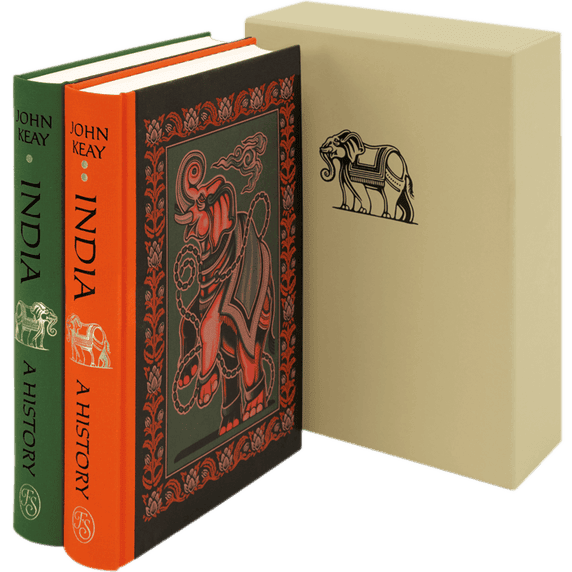
India
Spanning 5,000 years from the Bronze Age to the present, India: A History is John Keay’s masterful story of the subcontinent; revised and updated for the Folio Society in this fully illustrated edition.
A Study of Generalship
Introduced by Sir Lawrence Freedman
The Folio Society edition of The Mark of Command superbly presents celebrated military historian John Keegan’s appraisal of four famous generals: Alexander the Great, Wellington, Ulysses S. Grant and Hitler.
What qualities make a great general, and how have these changed over history? How far is heroism and success in warfare linked to the context of the specific time and place of the encounter? Celebrated military historian John Keegan (the acclaimed author of The Face of Battle) considers the nature of generalship through the lives and careers of four of the past’s most notable commanders. Alexander the Great, the Duke of Wellington, Ulysses S. Grant and Adolf Hitler are examined in this masterly study, which provides illuminating insights into the changing characteristics of military leadership.
Bound in blocked cloth
Set in Plantin
424 pages
Frontispiece, 7 integrated maps, and 32 pages of colour and black & white plates
Plain slipcase
10˝ x 6¾˝
‘He [Alexander the Great] was the complete commander, combining in his person the political and military strands of leadership, leading from the front, accepting the dangers of close combat, looking and acting the part, creating his own theatre of war with pre-battle rituals, oratorical appeals, magnificence in dress, and riding on his special horse Bucephalus’
- From the Introduction
The level of detail and scope of analysis in Keegan’s narrative is astonishing. He considers every aspect of these four remarkable (if not always admirable) leaders, both as generals and as individuals. We learn of Alexander the Great’s exceptional physical presence and outstanding abilities as a speaker and showman, with the author concluding that his success was due to a unique combination of nobility and savagery.
Keegan also reveals how Wellington’s service in India was the opportunity that enabled him to show his mettle, and how he displayed exemplary concern for his wounded troops throughout his life. The author discloses Wellington’s dislike of speeches and ceremony, and demonstrates his infinite capacity for ‘taking trouble’, so significant in his rise to greatness.
But in retrospect, great though Grant’s generalship is seen to be, it is his comprehension of the nature of the war, and of what could and could not be done by a general within its defining conditions, that seems the more remarkable
The author examines Ulysses S. Grant’s pioneering of ‘baseless campaigning’ in the American Civil War and probes his aversion (even more extreme than Wellington’s) to pomp and theatre. Grant and Wellington both benefitted from the support of their close and intimate circles of trusted advisers, in contrast to the sycophant aides surrounding the paranoid Führer – Hitler’s frontline Iron Cross-winning service as a ‘messenger’ during the First World War gave him an enduring feeling of superiority over his tactically more accomplished, but less combat-experienced, senior officers. Despite a good grasp of technical issues, Hitler’s lack of interest in new technologies (such as radar) proved a significant drawback on the military stage.
Hitler on the eve of death, indeed, endured circumstances scarcely different from those he had undergone in the four years of his youthful life on the Western Front. The world for him had come full circle
Emeritus Professor of War Studies and noted military authority Professor Sir Lawrence Freedman has written a new introduction which provides context to Keegan’s groundbreaking scholarship and explains why The Mask of Command’s pioneering exploration of the nature of war and battle has made it so revered (the book remains on the Chief of Defence Staff Reading List at the UK Defence Academy to this day). The Folio edition also features a wealth of contemporary images, including frescoes, paintings and photographs, showing the four generals in the settings of their most notable campaigns. Seven newly hand-drawn maps depict some of the most significant campaigns or battles, including Alexander’s empire, Waterloo, Shiloh and Hitler’s Europe, completing this new edition.
John Keegan (1934–2012) was a writer, historian and journalist. During the Second World War he was evacuated to Taunton in Somerset, where, aged ten, he watched preparations for the Normandy landings. Although fascinated by military affairs, Keegan could not serve owing to orthopaedic tuberculosis he contracted aged 13. After reading history at Oxford and a stint writing political reports for the US Embassy in London, he was appointed to a lectureship at the Royal Military Academy at Sandhurst, a post he held for 25 years. In 1986, when his friend Max Hastings became editor of the Daily Telegraph, he found unexpected but welcome employment as defence correspondent. Until not long before he died in 2012, and even after illness had severely restricted his mobility, he was still writing leaders for the paper. His publications include The Face of Battle (1976; Folio edition 2008), Six Armies in Normandy (1982), Battle at Sea (1988), The Second World War (1989), The Battle for History (1995) and Intelligence in War (2003). He received the OBE in the Gulf War honours list, and was knighted in the Millennium honours list in 1999.
Sir Lawrence Freedman is Emeritus Professor of War Studies at King’s College London. He held the Chair of War Studies between 1982 and 2014, and was Vice-Principal from 2003 to 2013. Before joining King’s, he held research positions at Nuffield College, Oxford, the International Institute for Strategic Studies and the Royal Institute of Security Studies. In 1997, he was appointed as Official Historian of the Falklands Campaign, and in 2009 was appointed to serve as a member of the official inquiry into Britain and the 2003 Iraq War. He has written extensively on nuclear strategy and the Cold War. His most recent books are Strategy: A History (2013), The Future of War (2017) and Ukraine and the Art of Strategy (2019).
